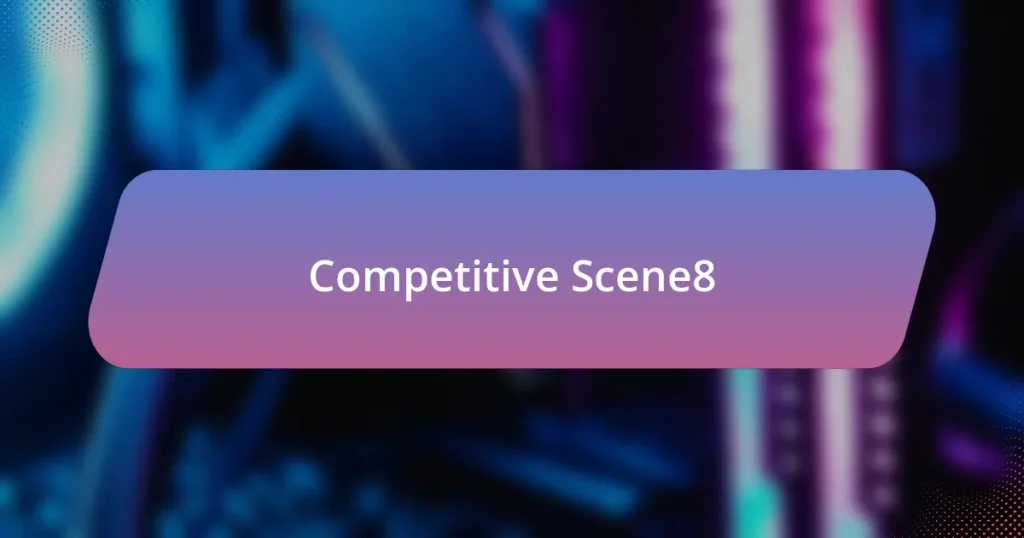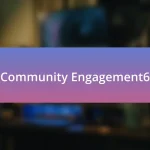The article examines the rise of women in Dota 2 esports, highlighting their significance in promoting diversity and inclusivity within a traditionally male-dominated environment. It discusses the evolution of female participation, marked by the formation of all-female teams and increased visibility in major tournaments. Key historical milestones, challenges such as gender discrimination and harassment, and the impact of community and industry support are analyzed. The article also addresses the contributions of notable female players and teams, the role of mentorship programs, and future prospects for women in the esports landscape, emphasizing the importance of creating equitable opportunities for aspiring female gamers.

What is the significance of women in Dota 2 esports?
Women in Dota 2 esports are significant as they contribute to diversity, representation, and the growth of the gaming community. Their participation challenges gender stereotypes and promotes inclusivity within a traditionally male-dominated space. For instance, the formation of all-female teams, such as Team Secret’s female roster, showcases talent and skill, leading to increased visibility and opportunities for women in competitive gaming. Additionally, events like the Dota 2 International have begun to feature female players and teams, further validating their role in the esports ecosystem. This shift not only empowers women but also enriches the overall gaming culture, fostering a more welcoming environment for future generations of female gamers.
How has the participation of women evolved in Dota 2 esports?
The participation of women in Dota 2 esports has significantly increased over the years, marked by the emergence of all-female teams and greater visibility in tournaments. Initially, women faced substantial barriers, including a lack of representation and support within the gaming community. However, initiatives such as the creation of female-only tournaments and leagues, like the Women’s Esports League, have fostered a more inclusive environment. Statistics indicate that the number of female players in Dota 2 has risen, with notable teams like Team Secret and Dota 2’s female squad, Team Aster, showcasing female talent on larger stages. This evolution reflects a broader trend towards gender inclusivity in esports, as more women are now participating in competitive play and gaining recognition for their skills.
What historical milestones mark the rise of women in Dota 2 esports?
The rise of women in Dota 2 esports is marked by several historical milestones, including the formation of all-female teams, participation in major tournaments, and the establishment of dedicated leagues. In 2015, the all-female team, Team Secret, gained recognition by competing in various tournaments, showcasing female talent in a predominantly male-dominated space. The introduction of the Women’s Esports League in 2016 provided a platform for female players to compete at a higher level, further legitimizing their presence in the scene. Additionally, the participation of female players in The International, particularly notable in 2019 with the all-female team, Dota 2 Ladies, highlighted the increasing visibility and acceptance of women in competitive Dota 2. These milestones collectively demonstrate the evolving landscape for women in Dota 2 esports, reflecting both challenges and triumphs in their journey.
How do women’s roles in Dota 2 esports compare to other esports?
Women’s roles in Dota 2 esports are often more prominent and visible compared to other esports, primarily due to the establishment of dedicated female leagues and tournaments, such as the Dota 2 Female League. In contrast, many other esports, like League of Legends and Counter-Strike: Global Offensive, have fewer structured opportunities specifically for women, leading to a less visible presence in those communities. The presence of female players in Dota 2 has been supported by initiatives like the “Women in Esports” movement, which aims to promote inclusivity and representation. This has resulted in a growing number of female players participating at high levels, as evidenced by teams like Team Secret and Team X, which have showcased female talent in major tournaments.
What challenges do women face in Dota 2 esports?
Women in Dota 2 esports face significant challenges, including gender discrimination, harassment, and a lack of representation. Gender discrimination manifests in biased perceptions that women are less skilled, which can limit their opportunities for recruitment and sponsorship. Harassment, both online and in gaming communities, creates a hostile environment that discourages female participation. Additionally, the underrepresentation of women in professional teams and tournaments leads to fewer role models and support networks, further hindering their advancement in the esports scene. These challenges are supported by studies indicating that women often experience higher rates of toxicity in gaming environments, which can impact their mental health and willingness to compete.
What are the common stereotypes and biases against women in gaming?
Common stereotypes and biases against women in gaming include the belief that women are less skilled than men, that they are only interested in gaming for attention, and that they do not belong in competitive environments. These stereotypes are perpetuated by a lack of representation in the industry and negative portrayals in media. For instance, a study by the International Game Developers Association found that only 22% of game developers identify as women, which contributes to the perception that gaming is a male-dominated space. Additionally, women often face harassment and discrimination in online gaming communities, further reinforcing these biases.
How do these challenges impact women’s participation and performance?
Challenges significantly hinder women’s participation and performance in Dota 2 esports. Factors such as gender bias, lack of representation, and toxic gaming environments create barriers that discourage women from competing. For instance, a study by the International Game Developers Association found that 46% of women in gaming reported experiencing harassment, which can lead to decreased motivation and increased dropout rates among female players. Additionally, the underrepresentation of women in professional teams limits role models and mentorship opportunities, further impacting their engagement and success in the esports scene.
What triumphs have women achieved in Dota 2 esports?
Women have achieved significant triumphs in Dota 2 esports, notably through the establishment of all-female teams and participation in major tournaments. For instance, the team “Team Secret” featured female players and competed in high-stakes events, showcasing their skills on an international platform. Additionally, the all-female team “Dota 2 Ladies” won the 2016 International Women’s Day tournament, highlighting their competitive prowess. These achievements demonstrate the growing presence and recognition of women in the Dota 2 esports scene, contributing to a more inclusive environment.
Which female players have made significant contributions to the scene?
Significant contributions to the Dota 2 esports scene have been made by players such as Kaci “Kaci” McKinney, who has been influential as a commentator and analyst, and Sasha “Scarlett” Hostyn, known for her achievements in competitive gaming, including Dota 2. Additionally, players like Jennifer “Jenna” Lee and the all-female team, Team Secret, have also played pivotal roles in promoting female participation in the esports community. Their involvement has helped to challenge stereotypes and encourage more women to engage in competitive gaming.
What are some notable all-female teams in Dota 2 esports?
Notable all-female teams in Dota 2 esports include Team Secret, Dota 2 Ladies, and Team X. Team Secret, formed in 2015, has been recognized for its competitive presence in various tournaments. Dota 2 Ladies, established in 2016, aimed to provide a platform for female players and has participated in several international events. Team X, which emerged in 2020, has also made strides in the competitive scene, showcasing the talent and potential of female gamers in Dota 2. These teams highlight the growing involvement of women in the esports landscape, contributing to the diversity and competitiveness of the Dota 2 community.

How do community and industry support influence women’s rise in Dota 2 esports?
Community and industry support significantly influence women’s rise in Dota 2 esports by providing resources, visibility, and opportunities for participation. Community initiatives, such as women-only tournaments and mentorship programs, create safe spaces for female players to develop their skills and gain confidence. For instance, events like the Women’s Esports League have showcased female talent, leading to increased recognition and support from sponsors and organizations. Industry backing, including sponsorships and partnerships with gaming companies, further enhances visibility and financial support, enabling women to compete at higher levels. Statistics show that female participation in esports has increased by over 30% in recent years, largely due to these supportive measures.
What initiatives exist to promote women in Dota 2 esports?
Initiatives to promote women in Dota 2 esports include organizations like Women in Games International and events such as the Dota 2 Female League. Women in Games International focuses on creating opportunities for women in gaming through mentorship and networking, while the Dota 2 Female League provides a competitive platform specifically for female players, fostering skill development and visibility. Additionally, various tournaments have introduced female-only divisions to encourage participation and showcase talent, contributing to a more inclusive environment in the esports community.
How do mentorship programs impact female players’ careers?
Mentorship programs significantly enhance female players’ careers by providing guidance, support, and networking opportunities. These programs connect aspiring female players with experienced mentors who offer insights into skill development, strategic gameplay, and industry navigation. Research indicates that mentorship can lead to increased confidence and improved performance; for instance, a study published in the Journal of Sports Psychology found that athletes with mentors reported higher levels of self-efficacy and career satisfaction. Additionally, mentorship fosters a sense of community, which is crucial in a male-dominated field like esports, helping female players to overcome challenges and achieve greater visibility and success in their careers.
What role do organizations play in supporting women in esports?
Organizations play a crucial role in supporting women in esports by providing resources, opportunities, and platforms for female gamers. They create inclusive environments through initiatives such as women-only tournaments, mentorship programs, and sponsorships tailored for female players. For instance, organizations like ESL and DreamHack have launched female-focused competitions, which not only promote visibility but also encourage participation among women in the gaming community. Additionally, research from the International Game Developers Association indicates that diverse teams lead to better performance, highlighting the importance of supporting women in esports for overall industry growth.
How does the gaming community respond to women in Dota 2 esports?
The gaming community’s response to women in Dota 2 esports is mixed, encompassing both support and significant challenges. While there are initiatives aimed at promoting inclusivity and recognizing female players, such as women-only tournaments and increased visibility of female gamers, many women still face harassment and discrimination within the community. Research indicates that female players often report negative experiences, including toxic behavior and sexism, which can deter participation. For instance, a study by the International Journal of Esports highlights that 50% of female gamers in competitive environments experience harassment, impacting their engagement in esports.
What are the positive and negative aspects of community engagement?
Community engagement in the context of Dota 2 esports has both positive and negative aspects. On the positive side, community engagement fosters inclusivity, allowing diverse voices, particularly women, to participate and contribute to the gaming environment, which can lead to increased representation and support networks. For instance, initiatives like women-only tournaments have been shown to enhance visibility and encourage female players to pursue competitive gaming. Conversely, negative aspects include potential toxicity and harassment within the community, which can discourage participation and create a hostile environment for women. Research indicates that 60% of female gamers report experiencing harassment, which highlights the challenges that community engagement can pose.
How can community support foster a more inclusive environment?
Community support can foster a more inclusive environment by actively promoting diversity and providing resources for underrepresented groups. When communities create safe spaces for women in Dota 2 esports, they encourage participation and collaboration, which can lead to increased visibility and representation. Research indicates that inclusive environments enhance performance and satisfaction, as seen in studies like “The Impact of Diversity on Team Performance” by Richard et al. (2018), which highlights that diverse teams outperform homogeneous ones due to varied perspectives and ideas. By offering mentorship programs, organizing inclusive events, and advocating for equitable treatment, community support directly contributes to breaking down barriers and fostering a culture of acceptance and belonging in esports.

What are the future prospects for women in Dota 2 esports?
The future prospects for women in Dota 2 esports are increasingly positive, driven by growing support and visibility within the gaming community. Initiatives such as women-only tournaments and organizations dedicated to promoting female players are emerging, which helps to create a more inclusive environment. For instance, the formation of teams like Dota 2’s “Team Secret” and “Dota 2 Ladies” showcases female talent and provides a platform for competition. Additionally, the increasing recognition of female players in mainstream esports events indicates a shift towards greater acceptance and opportunities. As of 2023, statistics show that female participation in esports has risen, with more women engaging in competitive gaming, which bodes well for the future of women in Dota 2 esports.
How can the esports industry further support female players?
The esports industry can further support female players by implementing targeted initiatives such as mentorship programs, increased funding for female-led teams, and creating inclusive tournament structures. Mentorship programs can connect experienced players with newcomers, fostering skill development and community support. Increased funding for female-led teams can enhance visibility and competitiveness, as evidenced by the success of organizations like Team Dignitas, which has invested in female esports talent. Additionally, creating inclusive tournament structures that prioritize equal opportunities can help address the gender disparity in competitive gaming, as seen in initiatives like the Women’s Esports League, which aims to provide a platform specifically for female players.
What changes are needed to create a more equitable playing field?
To create a more equitable playing field in Dota 2 esports, implementing inclusive policies and practices is essential. This includes establishing gender quotas in tournaments to ensure female representation, providing mentorship programs for aspiring female players, and promoting visibility of women in esports through media coverage and sponsorships. Research indicates that diverse teams perform better, as highlighted in a study by McKinsey & Company, which found that companies with higher gender diversity are 21% more likely to outperform their peers in profitability. These changes can help dismantle barriers and foster an environment where women can thrive in competitive gaming.
How can increased visibility of women in esports inspire future generations?
Increased visibility of women in esports can inspire future generations by providing relatable role models who demonstrate that success in gaming is achievable regardless of gender. When young girls see women competing at high levels, such as in Dota 2 tournaments, it challenges stereotypes and encourages them to pursue their interests in gaming and technology. For instance, the participation of female teams in major esports events, like the International, showcases their skills and dedication, fostering a sense of belonging and aspiration among aspiring female gamers. This visibility can lead to increased participation rates among women in esports, as evidenced by studies indicating that representation positively influences the confidence and ambitions of underrepresented groups in various fields.
What practical steps can aspiring female players take to succeed in Dota 2 esports?
Aspiring female players can succeed in Dota 2 esports by focusing on skill development, networking, and participating in tournaments. Skill development involves practicing regularly, studying game mechanics, and analyzing professional gameplay to improve individual performance. Networking is crucial; joining online communities, attending gaming events, and connecting with other players can provide support and opportunities. Participating in tournaments, especially those aimed at women, helps gain experience and visibility in the esports scene. According to a report by Newzoo, the esports audience is growing, and female representation is increasing, indicating a supportive environment for aspiring female players.
What skills should women focus on developing in Dota 2?
Women should focus on developing strategic thinking, teamwork, and communication skills in Dota 2. Strategic thinking enables players to analyze game situations, make informed decisions, and adapt to opponents’ strategies. Teamwork is crucial as Dota 2 is a team-based game, requiring effective collaboration with teammates to achieve objectives. Communication skills enhance coordination and facilitate sharing of information, which is vital for executing strategies and responding to in-game developments. These skills are essential for success in competitive environments, as evidenced by the increasing participation of women in esports and their growing recognition in tournaments.
How can networking and community involvement enhance their careers?
Networking and community involvement can significantly enhance careers in Dota 2 esports by providing opportunities for collaboration, mentorship, and visibility. Engaging with the community allows individuals to build relationships with industry professionals, which can lead to job opportunities and partnerships. For instance, women in esports who actively participate in community events often gain access to resources and support networks that can help them navigate challenges specific to their gender in a male-dominated field. Research indicates that networking can increase career advancement opportunities by up to 70%, highlighting its importance in professional growth.













